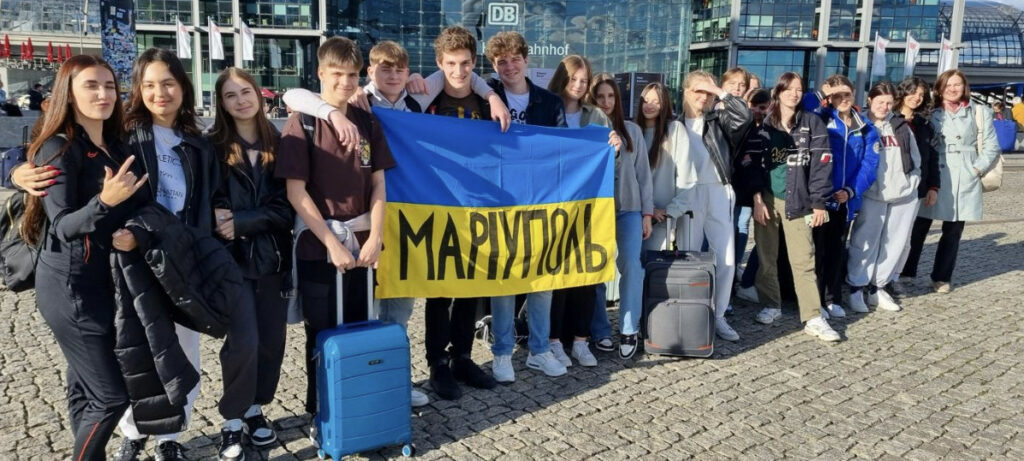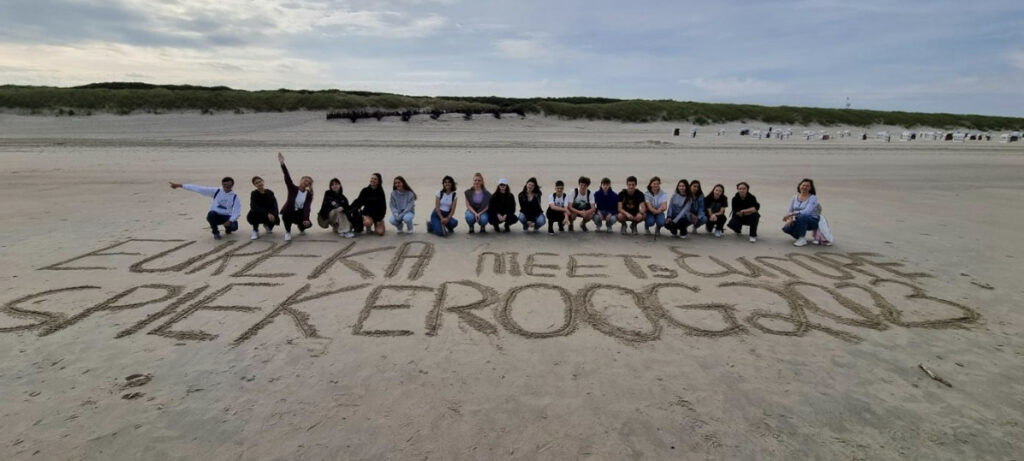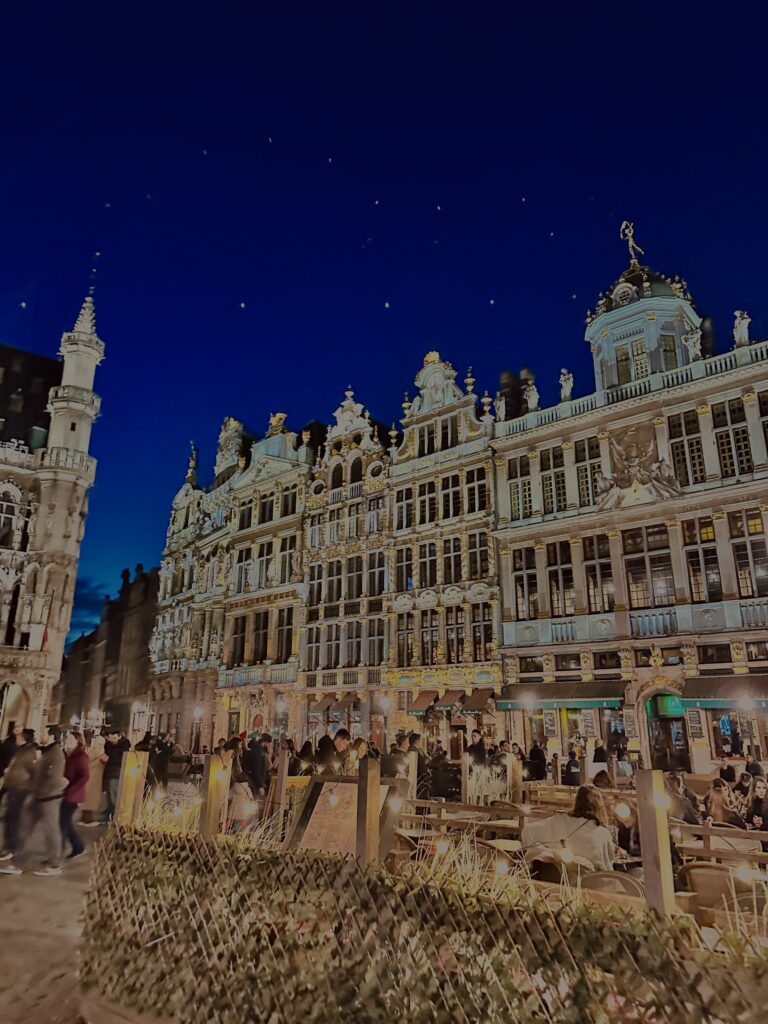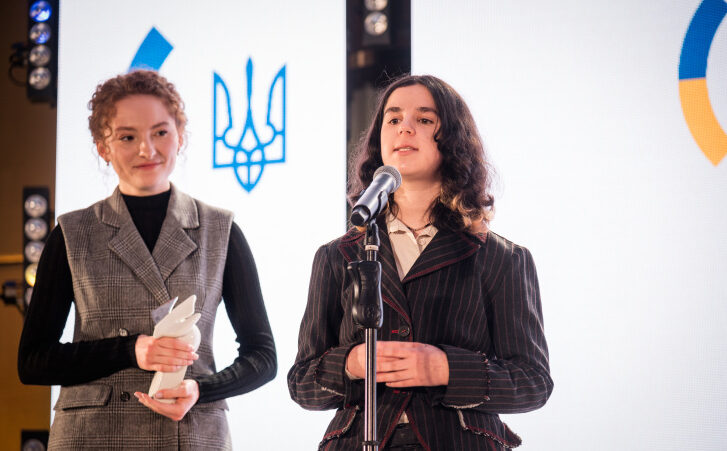
EUREKA MEETS EUROPE – opportunities to develop and study. My experience
Author: YEAs in UA Kseniia Fomina
In today’s globalised world, fostering intercultural understanding and cooperation is more vital than ever. After the start of the full-scale Russian invasion of Ukraine, the world has witnessed the bravery and resilience of the Ukrainian people as they continue to fight for freedom and democracy. In the face of adversity, Ukraine’s steadfast commitment to its values has not only captured the attention of the international community, but has also sparked accession talks with the European Union. As Ukraine’s aspirations for closer ties with the EU gain momentum, we find ourselves at a pivotal moment in history – an opportune time to bridge gaps, foster dialogue, and cultivate deeper connections between Ukraine and Europe.
Inspired by Ukraine’s bravery and the need for unity during these challenging times, my idea for the ‘Eureka Meets Europe’ project was born at the school in Germany where I am currently studying in my final year. The Alexander-von-Humboldt-Schule in the little town of Wittmund in Lower Saxony hosts a number of Ukrainian refugees. The aim of the initiative was to raise awareness among adolescents about the European Union’s values, promote EU-Ukraine dialogue, and facilitate the integration of young Ukrainians into European society. It all started during a chat with the school principal, where we both realised the power of education and cultural exchange. We wanted to create something meaningful that would not only teach about EU values but also bring Ukrainian and German students closer together.
As the project unfolded, it became a lively mix of learning and cultural exchange. Our weekly meetings at the school became the heart of the project, where Ukrainian and German students met, shared ideas and talked about EU topics. Each meeting was carefully planned to cover different aspects of the EU, like its history and policies. The impact of the project went beyond just the meetings and trips. It was visible in the friendships formed between Ukrainian and German students, in their newfound curiosity about different cultures, and in their sense of belonging to a larger European community. The project showed them the importance of tolerance, cooperation, and standing together, values that are at the core of the European Union. As the project grew, more and more students got involved, showing that there’s a real hunger for understanding and unity among young people.
Exciting lessons and extracurricular events were just the beginning. The project also included two transformative trips: one to the Bundestag in Berlin, which took place from 11-18 October 2023 and another to the European Parliament in Brussels from 11-14 February 2024. These trips offered participants firsthand insights into political processes and European history, from the aftermath of World War II to the creation of the EU. The programme included visits to numerous museums and lively discussions and debates. Moreover, they provided invaluable opportunities for direct interaction with policymakers, including enlightening conversations with politicians like German MEP Jens Gieseke.

Always having a keen interest in politics and international relations, I knew that I should try to reach out to someone in the European Parliament in Brussels who could show me the ropes of working as a European Union politician and also answer my questions. Therefore, during our visit to the European Parliament, I had the privilege of interviewing Mr Jens Gieseke, a prominent figure in EU politics. Our conversation centered on Ukraine’s potential accession to the EU and its implications for both Ukraine and the EU. Here are some highlights from the interview:
Mr Gieseke, with Ukraine’s accession talks gaining momentum, what do you believe are the main benefits and challenges for both Ukraine and the EU?
Jens Gieseke: “Ukraine’s potential accession to the EU represents a significant opportunity for deeper cooperation and mutual prosperity. It would strengthen the EU’s eastern flank, promote stability in the region and reaffirm the EU’s commitment to democracy and human rights. What Ukraine is fighting for are freedom, the rule of law, and human dignity – the core values of the EU. That is why we see Ukraine clearly in our alliance. However, challenges such as political reforms, corruption, and economic restructuring must be addressed diligently. The EU stands ready to support Ukraine on its path towards European integration, but progress will require sustained efforts from both sides.”
What role do you see young people playing in shaping the future of Ukraine and its relationship with the EU?
“Young people are the future leaders and changemakers of Ukraine. Their engagement, activism, and innovative thinking are essential for driving positive change and advancing European integration. Initiatives like the ‘Young European Ambassadors’ initiative or the ‘Eureka Meets Europe’ project play a crucial role in empowering young Ukrainians, fostering intercultural understanding, and building bridges between communities. By investing in youth education, participation, and entrepreneurship, we can unlock Ukraine’s full potential and ensure a brighter future for generations to come.”
Reflecting on the interview and the ‘Eureka Meets Europe’ project as a whole, it becomes clear that initiatives like these play a crucial role in shaping the future of Ukraine and its relationship with the EU. By fostering intercultural understanding, promoting dialogue and empowering young people, we can pave the way for a more united and prosperous Europe.

One pupil, Anna from Ukraine, shared how the project impacted her deeply, transforming not only her perceptions but also her aspirations for the future. “Before ‘Eureka Meets Europe,’ I had never imagined the breadth of cultures and opportunities within the European Union,” she said. “The project opened my eyes to the diversity and richness of European society, and it impressed me so much that I even started considering a future career in politics. Learning about EU policies and values ignited a passion within me to contribute to shaping the future of our continent.”
Similarly, Lukas from Germany said the project challenged his preconceived notions about Ukraine and its people. “Growing up, I had only heard negative stereotypes about Ukraine in the media,” he admitted. “But meeting Ukrainian students and hearing their stories first hand completely changed my perspective. I now have a deeper appreciation for their resilience and determination.”
These testimonials highlight the profound impact of the ‘Eureka Meets Europe’ project on its participants. By fostering genuine connections and facilitating meaningful dialogue, the project has not only promoted EU values and cooperation but has also inspired a new generation of global citizens.

LATEST

How you can help the planet every day

Building Europe: Poland’s experience of joining the European Union and lessons for Ukraine

World Health Day 2024: My Health, My Right

Can you wear pink in the workplace?

Go where your deepest fears lie: finding the courage to overcome gender barriers in STEM
More campaign pages:
Interested in the latest news and opportunities?
This website is managed by the EU-funded Regional Communication Programme for the Eastern Neighbourhood ('EU NEIGHBOURS east’), which complements and supports the communication of the Delegations of the European Union in the Eastern partner countries, and works under the guidance of the European Commission’s Directorate-General for Neighbourhood Policy and Enlargement Negotiations, and the European External Action Service. EU NEIGHBOURS east is implemented by a GOPA PACE-led consortium. It is part of the larger Neighbourhood Communication Programme (2020-2024) for the EU's Eastern and Southern Neighbourhood, which also includes 'EU NEIGHBOURS south’ project that runs the EU Neighbours portal.

The information on this site is subject to a Disclaimer and Protection of personal data. © European Union,